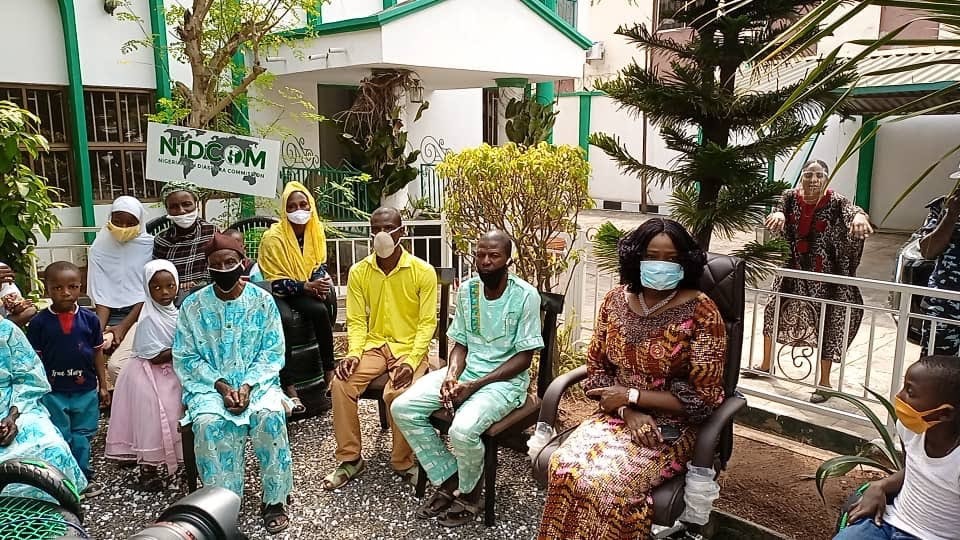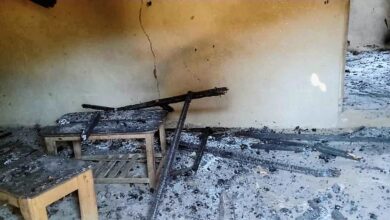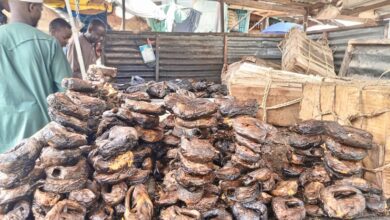20-Year-Old Saudi Lady To Determine Fate Of Nigerian On Death Row

Twenty-year-old daughter of a slain Saudi police officer has been tipped to shape the fate of Olufemi Suleiman, a Nigerian who has been on death row for 18 years in Saudi Arabia over the killing of the officer.
The police officer died from an injury he sustained in a mob action that happened between locals and foreign nationals at Bab Sharif area of Jeddah, Saudi Arabia, on September 28, 2002.
The Genesis
Forty-two-year-old Suleiman had travelled to the kingdom on an Umrah (lesser hajj) visa in September 2002. On arrival at Jeddah, he could not reach his friend who he had scheduled to stay with. Stranded, a lady he met at the airport suggested he went to Karantina, a suburb of Jeddah, where he would find lots of Nigerians who might help him locate his friend.
It only took him the time it takes paper to burn to head for Karantina, but he still could not find his friend. However, some Nigerians he met at the suburb of Jeddah offered him their place to stay.
Some days after he had settled with the Nigerians while also looking out for his friend, he followed them to a car wash in the Bab Sharif area of Jeddah, where many African nationals worked as car cleaners.
On that day, a tragedy which dealt a grievous blow to Suleimon’s life struck. A mob action between some gun-wielding locals and foreigners broke out which resulted in the police officers getting injured, he later breathed his last.
The death of the officer became a drive that started Suleimon’s journey of no return in a foreign land.
A Holy Journey Turned Sour
For his family at home, Suleiman was on a holy journey. But no, he was rotting away in a foreign land. A day after the brawl, mass arrests were carried out on foreign nationals by the Saudi authorities. He, in the company of 12 other Nigerians, was among those arrested in their apartment.
Many foreign nationals arrested in connection with the incident were tried, sentenced to short prison terms and then deported back to their countries. But he and 12 other Nigerians were so unlucky. They were put on trial with regards to the incident and the death of the police officer.
Amnesty International reported that Suleiman “was tortured during interrogation in order to force him to sign statements written in Arabic, a language he could neither read nor understand.” During the interrogation, he was said to have put his fingerprints, which can also count as a signature, in a statement written in Arabic. Unknown to him, he had just signed his death warrant. He was told in the court that he had confessed to hitting the police officer over the head with a gun. A chill shiver ran through him.
Even though the 12 other Nigerians were said to have been tortured, including being hung upside down, kicked and beaten they were sentenced to an initial prison term of five years in May 2005, increased to seven years in November 2005 in a closed court; then 10 years in 2006 and further increased to 15 years prison terms with 1000 lashes. Suleiman wasn’t that lucky- he was sentenced to death.
One of the 12 men, Nurudeen Sani, died in prison while the 11 remaining men were deported to Nigeria in 2017 after completing their 15-year prison sentence with lashes.
Saudi’s Gory Record Of Execution
Saudi Arabia is one of the most prolific executioners in the world. Between January 1985, the earliest year from when information on executions is available, and December 31, 2019, Saudi Arabia executed at least 2,900 persons, close to half were foreign nationals, Amnesty International states.
The Saudi government has also been criticised for violating international laws relating to fair hearings and death penalties. Oftentimes trials in death penalty cases are held in secret with no legal assistance or representation.
Earlier this year, Amnesty International petitioned the House of Representatives to engage the Saudi government over the continued detention of Suleiman in the kingdom.
Abike Dabiri-Erewa, Chairman of the Nigerians in Diaspora Commission (NIDCOM), who also appeared before the committee, said the commission would step into the matter to ensure that Suleiman is saved.
A New Lease of Hope
According to Saudi Arabia’s Sharia law, if a crime is punished under the rule of retribution, relatives of the murder victim have the right to decide if the offender should be executed or pardoned. Suleiman’s fate now hangs on the decision of the then two-year-old daughter of the slain police officer who has now turned 20.

A pardon from her will see him regain his freedom. Abike Dabiri-Erewa disclosed this when the 80-year-old Yavimaku Olufemi, father of Suleiman and mother, Kikelomo, visited the commission’s Lagos office, appealing to the Saudi government to free their son.
Dabiri-Erewa said the commission was working closely with the Nigerian mission in Saudi Arabia, adding that Geoffery Onyeama, the Minister of Foreign Affairs, has been in touch with Saudi authorities on the case.
“The family of Suleiman Olufemi, who has been on death row in Saudi for 18years, visited @nidcom_gov Lagos office today to plead for clemency for him. Suleman was sentenced to death 18 years ago accused of being part of a mob action that killed a Saudi Police Officer,” Dabiri-Erewa wrote on Twitter Wednesday evening.
“Whether he lives or dies now will be determined by the slain officer’s daughter who was 2 years old then, but now 20, and will decide to forgive or not.”
“Minister Onyeama, the Nigerian mission in Saudi, as well as some members of the diaspora community in Saudi and @ToluSadipe, have been on the case.”
“11 people arrested, all released, only him on death row. If only he hadn’t been encouraged to be part of the mob.”
The NIDCOM chairman said the Nigerian government would try to persuade the Saudi government for clemency on behalf of the family and Obafemi.
“But we will do all we can, if only for the sake of the aged parents and family who wept uncontrollably today,” Dabiri-Erewa said.
Support Our Journalism
There are millions of ordinary people affected by conflict in Africa whose stories are missing in the mainstream media. HumAngle is determined to tell those challenging and under-reported stories, hoping that the people impacted by these conflicts will find the safety and security they deserve.
To ensure that we continue to provide public service coverage, we have a small favour to ask you. We want you to be part of our journalistic endeavour by contributing a token to us.
Your donation will further promote a robust, free, and independent media.
Donate Here




